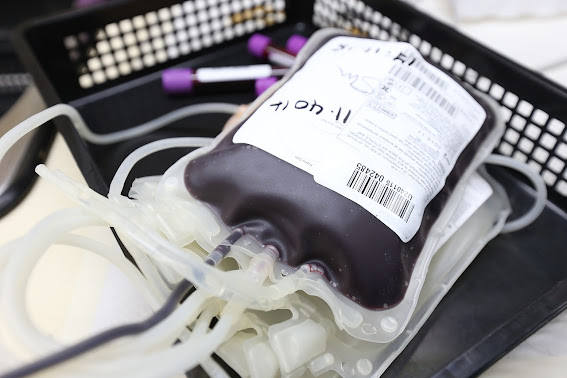Blood Donation Requirements
 |
| Blood donation is one of the most important and selfless things you can do to save a life! |
The blood donor requirements in the US may vary slightly depending on the blood center or blood bank, but in general, donors must meet the following criteria:
- Age: Donors must be at least 17 years old (16 years old with parental consent in some states).
- Weight: Donors must weigh at least 110 pounds.
- Health: Donors must be in good health, feeling well, and free from cold or flu symptoms.
- Hemoglobin level: Donors must have a hemoglobin level of at least 12.5 grams per deciliter (g/dL) for females and 13.0 g/dL for males.
- Medications: Some medications can affect eligibility, so donors should inform the blood center staff of any medications they are taking.
- Travel and residency: Donors who have traveled to certain countries or lived in certain regions may be deferred for a period of time due to potential exposure to infectious diseases.
- Sexual activity: Donors who engage in certain high-risk sexual activities or have been diagnosed with certain sexually transmitted infections may be deferred.
- Medical history: Donors with certain medical conditions or histories may be deferred, such as those with a history of cancer or certain heart conditions.
It's important to note that these requirements are in place to ensure the safety of both the donor and the recipient of the blood donation. Potential donors should contact their local blood center or blood bank to confirm their eligibility to donate, such as their local Red Cross, Bloodworks Northwest, Vitalant, etc.
Common Blood Donation Deferrals:
Recent illness: If you have had a fever or an illness, you may be deferred from donating blood until you have fully recovered.
Recent travel: If you have recently traveled to certain countries or regions, you may be deferred from donating blood due to the risk of exposure to infectious diseases such as malaria, Zika virus, or Ebola.
Anemia: If you have a low hemoglobin level or are anemic, you may be deferred from donating blood.
Medications: Certain medications may defer someone from donating blood, such as blood thinners, aspirin, or certain antibiotics.
High-risk behavior: If you engage in certain high-risk behaviors, such as using intravenous drugs or having unprotected sex, you may be deferred from donating blood due to the risk of transmitting infections such as HIV, hepatitis B or C, or syphilis.
There are several diseases and conditions that may defer someone from donating blood in the US. Some of the common ones include:
- HIV or AIDS
- Hepatitis B or C
- Syphilis
- Malaria
- Creutzfeldt-Jakob Disease (CJD) or Variant Creutzfeldt-Jakob Disease (vCJD)
- Zika virus infection
- Babesiosis
- Chagas disease
- West Nile virus infection
- Ebola virus infection
In addition to these diseases, some medical conditions may also defer a person from donating blood, such as certain types of cancer, heart disease, and autoimmune disorders.
Can you donate blood if you have tattoos?
Yes, you can donate blood if you have a tattoo in most cases, but the eligibility criteria may vary depending on the tattoo's age and the state where the donation takes place.
In general, if you have had a tattoo, piercing, or any other form of body art, you may be temporarily deferred from donating blood for a certain period. The deferral period is usually 3-12 months, depending on the state and the type of tattoo or piercing. This is because there is a risk of infection from the needles and ink used in the tattoo process.
However, if the tattoo was done in a state-regulated and licensed facility, and if the tattoo artist used sterile needles and ink, the deferral period may be shorter or even waived.
Can I Donate Blood If I Have Cancer?
In general, individuals who have been diagnosed with cancer are typically deferred from donating blood in the US, as there is a risk of transmitting cancer cells through blood transfusions. However, there may be some exceptions depending on the type of cancer and the stage of the disease.
If you have been diagnosed with cancer, you should consult with your doctor to determine your eligibility to donate blood. Your doctor can provide specific guidance on whether or not you are eligible to donate blood based on your individual medical history and current health status.
In some cases, individuals who have had certain types of cancer and have been cancer-free for a certain period of time may be eligible to donate blood. However, this may vary depending on the blood center or blood bank and the specific criteria they have in place.
The specific types of cancer that may prevent someone from donating blood include:
- Leukemia or lymphoma: These are cancers that affect the blood and bone marrow and may increase the risk of transmission of cancer cells through blood transfusions.
- Multiple myeloma: This is a type of cancer that affects plasma cells, which may also increase the risk of cancer cell transmission through blood transfusions.
- Hodgkin's disease: This is a type of lymphoma that affects the lymphatic system and may also increase the risk of cancer cell transmission through blood transfusions.
- Other types of cancers: Individuals who have been diagnosed with other types of cancers may also be deferred from donating blood, depending on the type and stage of the cancer.
